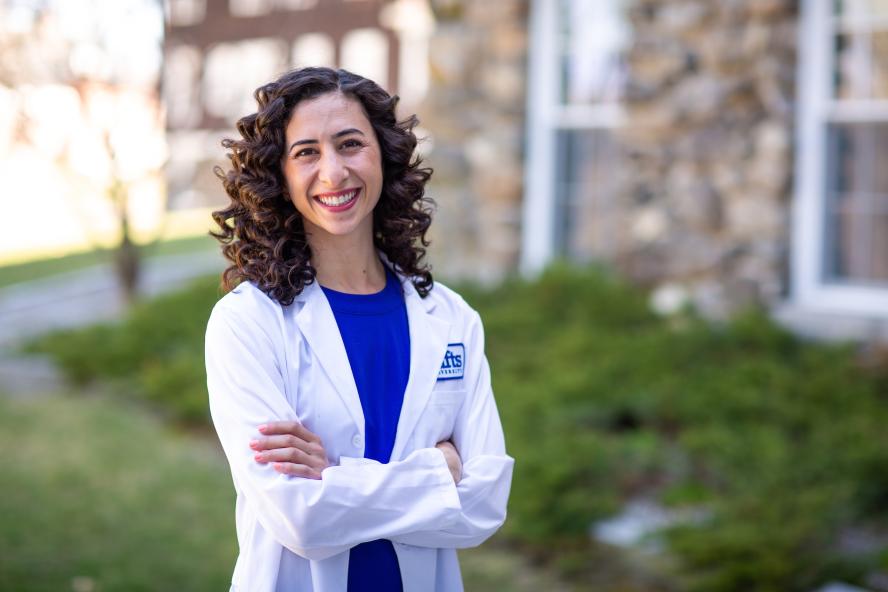-
About
- Leadership & Faculty
- News & Events
-
Academics
- Graduate
- Advanced Clinical Training
- Continuing Education
- Academic Offices
-
Student Life
-
Research
-
Hospitals & Clinics
- Emergency Care
- Hospital Services
-
Community Outreach
- Volunteer
A New Veterinarian Reflects on a Busy Four Years
Tiana Rangchi, V21, served as co-president of the Class of 2021 and recently won a National Business Aptitude Award

By Meredith Berg
It’s a little surprising that Tiana Rangchi, who as a child was not allowed to have a cat or dog, is now on the cusp of becoming a veterinarian.
Rangchi, who graduates from Cummings School of Veterinary Medicine this month, said that while growing up in northern California, her parents, who are Persian, did not think it was right to have animals inside the home. But while in high school, as Rangchi’s interest in veterinary medicine grew, she started bringing home adorable Labrador retriever puppies to train as guide dogs for the blind. That’s when her parents slowly started to yield on their animals-in-the-house ban and felt the love for animals as much as she already did.
Now, four years after Rangchi started veterinary school, her parents fully support her dream to become a veterinarian. And, Rangchi adds, her mother and father each have a dog and pamper them like family.
In addition to her parents as some of her top supporters, Rangchi expressed gratitude toward Assistant Professor Christopher Schonhoff at Cummings School, who, she said, helped make lecture-based, first-year courses, including biochemistry, engaging for her. His light-hearted nature, she said, had a calming effect on her and her classmates.
“He seemed very interested in making sure the students were getting what we should be getting out of the courses and that we weren’t getting frustrated with the material. I always appreciated that about him,” she said.
Rangchi, meanwhile, emerges from Tufts as the Class of 2021 co-president for all four years, who in January won a $35,000 National Business Aptitude Award from the Simmons Educational Fund, which she put toward her last year of veterinary school. She said she jumped into the role in part because she felt so fortunate to learn she would enroll at Cummings School—just two weeks before the semester began when she got off the waitlist in Fall 2017.
“I wanted to invest myself in the program and the class, and I thought that this was one of the best ways I could do so,” said Rangchi. “I got a closer look into what our program was about. It gave me a greater appreciation of the program.”
As co-president, she worked on various projects, from scheduling events like BBQ’s and mock exams to compiling a weekly bulletin, to organizing the veterinary school’s annual Fur Ball, including the infamous annual parody videos. Rangchi said her involvement was rewarding and a great learning experience.
While the COVID-19 pandemic in early 2020 delayed by three months her class’s start for clinical rotations at the animal hospitals on the Grafton campus, Rangchi said there were some positive byproducts from moving overnight to online courses: she improved her communication skills, learned to set realistic expectations, found success learning independently, and became more bonded with her support system of four fellow veterinary students.
She also said the veterinary program as a whole helped her learn to put more of an emphasis on work-life balance. “This pandemic has forced us to give each other more space and look out for each other’s mental health more,” Rangchi said. “I think that will affect the program positively permanently, in that students will have more days off and more hours off, and students are seeing fewer cases and learning more with each case.”
Within the next five to ten years, her goal is to buy into a small animal multi-doctor practice in southern California. For the immediate future, Rangchi has accepted an associate position at Sacramento Animal Hospital.
Finally, a personal reflection Rangchi will always take with her: That a prominent core value in veterinary medicine centers on lifelong learning. Rangchi said she wishes she didn’t stress as much about the amount of learning she needed to do to become an animal doctor. It’s all about taking it one day at a time and, she said, knowing that “you have a whole career to continue learning new things.”
Department:
DVM Program